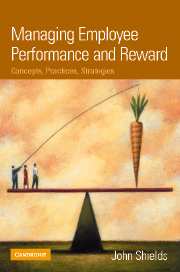Book contents
- Frontmatter
- Contents
- List of figures and tables
- Foreword by John Egan
- Acknowledgements
- Introduction: Setting the scene
- Part 1 The fundamentals
- Part 2 Performance management in action
- 5 Managing for results
- 6 Managing behaviour
- 7 Managing competencies
- 8 Performance review and development
- Case study. Delivering fairness: Performance assessment at Mercury Couriers
- Part 3 Base pay and benefits
- Part 4 Rewarding employee performance
- Part 5 Fitting it all together
- Model responses to case studies
- References
- Index
7 - Managing competencies
from Part 2 - Performance management in action
- Frontmatter
- Contents
- List of figures and tables
- Foreword by John Egan
- Acknowledgements
- Introduction: Setting the scene
- Part 1 The fundamentals
- Part 2 Performance management in action
- 5 Managing for results
- 6 Managing behaviour
- 7 Managing competencies
- 8 Performance review and development
- Case study. Delivering fairness: Performance assessment at Mercury Couriers
- Part 3 Base pay and benefits
- Part 4 Rewarding employee performance
- Part 5 Fitting it all together
- Model responses to case studies
- References
- Index
Summary
Having examined the concepts, methods and processes associated with managing employee results and behaviour, we can now turn our attention to the last and, in many respects, most complex and controversial of the three horizontal dimensions of work performance, namely those performance inputs or capabilities that have come to be known generically as ‘competencies’. Like the behavioural approach, with which it has a close affinity, the competencies approach is necessarily individual in focus; indeed, the competencies construct itself derives from studies of the psychology of individual difference. The competencies concept also has a close association with the resources-based view of human resource management, which we have argued (in chapter 4) is best understood as an internally focused prescription for ‘best fit’.
This chapter opens with a discussion of the competencies concept. This is followed by an examination of the techniques and processes involved in competency analysis and identification and in modelling competency-based or competency-related performance management systems. Then we turn our attention to the techniques involved in assessing the competency profiles of individual employees, and a final section of the chapter assesses the strengths, weaknesses and ‘best fit’ aspects of the competencies approach.
The ‘competencies’ construct and competency-based human resource management
As noted previously, at the level of the individual employee, performance inputs consist of a combination of job knowledge, skills and abilities, or ‘KSAs’, to use the commonly applied acronym.
- Type
- Chapter
- Information
- Managing Employee Performance and RewardConcepts, Practices, Strategies, pp. 179 - 199Publisher: Cambridge University PressPrint publication year: 2007

